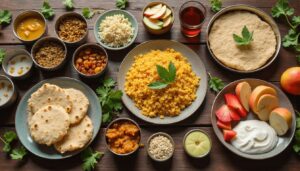Life's sweet moments often come at unexpected times like at a cozy diner, enjoying your grandmother's apple pie, or during a casual Sunday brunch. For many, these moments come with a hidden worry: managing blood sugar. Let's explore the best ways to lower blood sugar levels quickly or how to keep blood sugar in check naturally. This way, you can enjoy life's sweetness without health worries.
Imagine feeling free from blood sugar worries, without needing medical help or dealing with symptoms. Your journey is about making smart choices and caring for yourself every day. These choices can greatly improve your health. This guide will help you understand how to manage glucose naturally, leading to a healthier life.
Next, we'll share tips on balancing your blood sugar. We'll cover nutrition, physical activity, and emotional well-being. Get ready for a journey to better health. No need for a degree, just a willingness to start making positive changes.
The Importance of Blood Sugar Regulation
Blood sugar regulation is key to your health. It affects your energy and your risk of chronic diseases. Keeping blood sugar levels healthy can prevent diabetes and other metabolic problems. Let's look at how your body regulates glucose and the benefits of doing it well.
Glucose regulation is done with hormones like insulin and glucagon. These hormones keep glucose levels just right. Insulin lowers blood sugar by helping cells take in glucose. Glucagon raises levels by telling the liver to release stored glucose. This balance is crucial for your body to work right.
Keeping blood sugar in check lowers your diabetes risk and cuts down on heart and kidney diseases. It also boosts your brain health. Knowing how to control blood sugar is key to a healthier life.
- Increased energy and better mood
- Lower risk of cardiovascular diseases
- Enhanced mental clarity and function
Learning about blood sugar management comes from seeing the bad effects of poor management. High levels can cause insulin resistance, making cells less responsive to insulin. This can lead to serious problems like Type 2 diabetes over time.
Here's a table to show how managing blood sugar affects your health:
| Aspect of Health | Impact of Maintaining Healthy Blood Sugar |
|---|---|
| Cardiovascular Health | Decreased risk of heart disease and stroke |
| Weight Management | Improved weight control and reduced risk of obesity |
| Cognitive Function | Better concentration and memory retention |
| Mood Stability | Reduced risk of depression and mood swings |
| Overall Longevity | Increased lifespan and healthier aging |
Glucose regulation is more than just watching what you eat. It's about finding a balance that supports your body. Adding good blood sugar control to your life has many benefits, leading to a full and active life.
Identifying the Triggers of Blood Sugar Spikes
Managing your blood glucose levels starts with knowing what causes spikes. Your food choices and lifestyle habits are key. Let's explore the main causes of blood sugar spikes and how certain foods and behaviors affect your glucose levels.
Common Dietary Culprits
One big reason for blood sugar spikes is what you eat. Foods high in simple carbs, like white bread and pastries, can quickly raise your blood glucose. Here are some foods to watch out for:
- Sugary drinks like soda and fruit juices
- Refined grains in white bread and pasta
- High-sugar snacks, such as cookies and cakes
- Fried foods and other high-fat fast food
Lifestyle Factors that Affect Blood Sugar Levels
Your daily habits also impact your glucose levels. Not moving enough, not sleeping well, and feeling stressed can cause spikes. It's important to keep these factors in check for balanced glucose levels:
- Physical Activity: Sitting too much lowers insulin sensitivity, raising glucose levels.
- Sleep Quality: Bad sleep messes with hormones that control blood sugar, making it harder to manage.
- Stress: Stress releases hormones like cortisol and adrenaline, which can increase blood glucose.
Keep an eye on your diet and lifestyle to manage and prevent blood sugar spikes. Take charge of your health by understanding these triggers and changing your habits.
Dietary Choices to Stabilize Blood Sugar
Choosing a balanced diet is key to keeping glucose levels stable and improving health. Knowing which foods to pick is crucial for managing blood sugar. It's about making healthy eating a part of your everyday life.
Adding a mix of nutrient-rich foods to your meals makes your diet more balanced and helps with glucose control. Here are some tips to stabilize glucose levels:
- Whole grains: Pick brown rice, quinoa, and whole oats over refined grains for more fiber. This fiber slows down how fast glucose gets into your system.
- Healthy fats: Add unsaturated fats like avocados, nuts, and olive oil to your meals. These fats don't affect blood sugar and can make you feel full longer.
- Lean proteins: Use lean meats, legumes, and tofu to stay full without a spike in blood sugar.
- Fibrous fruits and vegetables: Eat fiber-rich fruits like berries and apples, and veggies like carrots and leafy greens. They slow down glucose absorption and keep levels stable.
It's also important to eat fewer processed foods to control blood sugar. These foods often have a lot of sugar and unhealthy fats. Instead, choose fresh and whole foods that support a balanced diet and overall health.
| Food Type | Benefits | Examples |
|---|---|---|
| Whole Grains | High in fiber, slow glucose absorption | Brown rice, whole oats |
| Healthy Fats | Does not spike blood sugar, increases satiety | Avocados, nuts |
| Lean Proteins | Stabilizes blood sugar, keeps you full | Chicken breast, legumes |
| Fruits & Vegetables | Rich in fiber and nutrients, low in calories | Berries, leafy greens |
These dietary tips can help stabilize your blood sugar and improve your health. Try different foods in these categories and see how they affect your glucose levels. Adjust your diet based on what works best for you.
Incorporate Low Glycemic Index Foods
Adding low glycemic index foods to your diet helps manage blood sugar levels well. It's key to know how foods affect your glucose levels. This helps keep your energy steady all day and avoids spikes that can harm your health.
Low glycemic index foods have a lower GI score. They take longer to digest, slowly releasing sugar into your blood. Eating these foods helps keep your blood sugar stable, reduces hunger, and gives you steady energy.
- Oats
- Barley
- Legumes
- Non-starchy vegetables
- Most fruits
- Whole wheat products
Following a GI diet means picking foods wisely and mixing them right. Here are some meal ideas that follow these principles:
| Meal Type | Low-GI Food Ideas |
|---|---|
| Breakfast | Oatmeal with berries and flaxseeds |
| Lunch | Quinoa salad with chickpeas and a variety of vegetables |
| Dinner | Grilled chicken with a side of mixed greens and sweet potatoes |
| Snacks | Apple slices with almond butter |
When starting a GI diet, slowly add low-GI foods to your meals. Watch how your body reacts to different foods. Adjust your diet to keep your blood glucose levels just right.
The main aim of a low-GI diet is to manage blood sugar and boost metabolic health. By choosing wisely, you're moving towards a healthier life. This supports your body's needs in a lasting way.
Best Ways to Lower Blood Sugar Levels Quickly
Looking for ways to quickly lower blood sugar levels? It's important to think about what and when you eat. Eating snacks that help balance glucose and planning your meals can keep your glucose levels stable all day.
Quick Snacks to Balance Glucose
Choosing the right snacks is key to keeping your glucose balanced. Go for snacks loaded with fiber, healthy fats, and protein. These help slow sugar absorption, avoiding spikes. Here are some great snack options:
- Almonds and other nuts
- Greek yogurt with berries
- Apple slices with peanut butter
- Vegetables with hummus
- Cottage cheese with flaxseeds
Timing Your Meals for Optimal Blood Sugar Control
When you eat can affect your blood sugar levels. Eating smaller meals more often helps avoid big spikes and keeps energy steady. Consider this schedule:
| Time of Day | Meal/Snack Example | Notes |
|---|---|---|
| Breakfast (7-8 AM) | Oatmeal with chia seeds | High in fiber and protein |
| Mid-Morning Snack (10-11 AM) | A handful of walnuts | Provides healthy fats and protein |
| Lunch (12-1 PM) | Grilled chicken salad | Lean protein with low GI vegetables |
| Afternoon Snack (3-4 PM) | Carrot sticks with guacamole | Rich in fiber and healthy fats |
| Dinner (6-7 PM) | Fish with steamed broccoli | Lean protein and high in fiber |
Stay Hydrated for Better Blood Sugar Management
Managing your blood sugar levels isn't just about food; it's also about water intake. Hydration is key to keeping your blood sugar balanced and your metabolism healthy. Drinking more water helps manage blood sugar by supporting your kidneys and getting rid of extra glucose through urine.
Not drinking enough water can make your blood sugar go up. This happens because there's more glucose in your blood. To prevent this, it's important to stay hydrated. Drinking enough water makes your blood less concentrated and helps your hormones control blood glucose better. So, knowing how hydration and blood sugar are connected is crucial for managing your glucose levels.
- Regularly check how well you're hydrated, not just how much water you drink.
- Use reminders to drink water all day to stay hydrated consistently.
- Add foods like cucumbers, zucchini, and watermelon to your meals for extra hydration.
Here’s a simple guide to help you balance your water intake for better blood sugar control:
| Time of Day | Suggested Water Intake |
|---|---|
| Morning (Upon waking up) | 16 oz |
| Mid-morning | 8-12 oz |
| Lunch | 16 oz |
| Afternoon | 8-12 oz |
| Dinner | 16 oz |
| Before bed | 8-12 oz |
This table shows how much water you should drink at different times to help manage blood sugar naturally. Following these tips can improve your hydration and blood sugar levels, leading to better health.
Boost Your Physical Activity
Boosting your physical activity is key for better blood sugar control. Regular exercise helps lower blood glucose levels and boosts your health. This section looks at the best exercises for managing blood sugar and how staying active helps control glucose levels.
Type of Exercises Beneficial for Blood Sugar Control
For managing blood sugar, focus on workouts that improve heart health, build strength, and increase flexibility. Here are some top activities:
- Aerobic exercises like walking, cycling, running, and swimming boost heart health.
- Strength training with weights or resistance bands helps with muscle mass, important for glucose metabolism.
- Flexibility exercises like yoga or pilates help reduce stress, which is good for glucose levels.
How Regular Movement Affects Glucose Levels
Regular physical activity can change your health for the better. It makes your body more sensitive to insulin, lowering blood glucose levels. Exercise also helps with weight management, which is key in controlling diabetes.
| Exercise Type | Benefits for Blood Sugar | Recommended Frequency |
|---|---|---|
| Aerobic Exercise | Improves insulin sensitivity, lowers blood sugar | 150 minutes per week |
| Strength Training | Increases muscle mass, enhances glucose uptake | 2-3 sessions per week |
| Flexibility Exercises | Reduces stress, potentially lowering blood sugar spikes | Daily or several times a week |
Strategically Plan Your Meals and Portion Sizes
How meal planning for blood sugar can change your diet is key. It helps you control your daily food intake.
Here's how to plan meals that keep your blood sugar stable:
- Create a weekly meal plan with a mix of nutrients like fiber, protein, and healthy fats to manage blood sugar levels.
- Use standardized cups or scales to measure and check your portions. This helps keep your calorie intake steady, which is important for blood sugar control.
- Make meals at home as much as you can. This lets you control the ingredients and the nutritional value of your food.
Below is a table with portion sizes that help keep blood sugar levels balanced:
| Food Group | Recommended Portion Size | Benefits for Blood Sugar |
|---|---|---|
| Whole Grains (e.g., brown rice, quinoa) | 1/2 cup cooked | Rich in fiber, aids in slow sugar absorption |
| Lean Protein (e.g., chicken, tofu) | 3-4 oz | Helps feel satiated longer without significant glucose spikes |
| Vegetables (e.g., broccoli, leafy greens) | 1 cup raw or 1/2 cup cooked | Provides essential nutrients with low glycemic impact |
Following these guidelines makes controlling portion sizes and choosing balanced meals for glucose easy and fun.
Sticking to a regular meal schedule is key to avoiding blood sugar swings. Eat at set times and consider healthy snacks between meals if needed. Meal planning for blood sugar is about what you eat and when you eat it.
Begin with a simple meal plan and adjust as you learn how your body reacts to different foods and sizes. Remember, every meal can help you manage your blood sugar levels.
Consider Natural Supplements and Herbs
If you're looking into natural supplements for blood sugar, knowing how certain herbs and nutrients work can help a lot. Supplements like cinnamon, chromium, and magnesium are getting attention for their possible benefits. They might improve insulin sensitivity and keep glucose levels healthy.
Effectiveness of Cinnamon and Blood Sugar
Cinnamon is more than just a spice for your coffee. It's a strong tool against high blood sugar. It works like insulin, helping to lower blood sugar levels. Adding cinnamon to your meals could make your body more sensitive to insulin and help with glucose metabolism.
Chromium's Role in Glucose Metabolism
Chromium is a tiny mineral that makes insulin receptors work better. Studies show it can improve how the body uses glucose, fats, and proteins. This turns them into energy and keeps blood sugar stable.
Magnesium and It's Impact on Insulin Sensitivity
Magnesium is key for over 300 body reactions, including insulin signaling. It's known to help with insulin sensitivity. Getting enough magnesium is important for controlling glucose and preventing insulin resistance.
| Supplement | Key Benefits | Recommended Daily Intake |
|---|---|---|
| Cinnamon | Mimics insulin, lowers blood sugar levels | 1-6 grams |
| Chromium | Improves glucose metabolism, enhances insulin receptors' sensitivity | 20-35 micrograms |
| Magnesium | Supports insulin signaling, regulates glucose levels | 310-420 milligrams |
Implement Stress Reduction Techniques
Managing stress is key to keeping your blood sugar healthy. When stressed, your body boosts blood sugar to get ready for danger. This can hurt your glucose control if it keeps happening. Learning to reduce stress can greatly improve your health.
The Connection Between Stress and Blood Sugar
It's important to know how stress affects your glucose levels. Stress makes your body release hormones like cortisol and adrenaline. These hormones increase blood sugar to help you react quickly. If not managed, this can be hard for people with blood sugar issues.
Mindfulness Practices for Blood Sugar Regulation
Adding mindfulness to your day can help with blood sugar. Activities like meditation, deep breathing, and yoga are great for reducing stress and controlling blood sugar. Doing these exercises regularly can make you less stressed and help keep your glucose stable.
By focusing on reducing stress, you help manage your blood sugar better. This approach leads to a healthier life and better balance.
Conclusion
We've looked at many natural ways to manage blood sugar levels. We've learned about the causes of blood sugar spikes and how to keep it stable. Making dietary changes, staying active, and reducing stress are key steps.
These steps work together to support your health. By focusing on consistency, you can make a big difference. Even small changes can lead to big improvements in your health.
Using natural supplements, planning your meals, and understanding lifestyle effects are also important. You can adjust these strategies to fit your life and needs.
In conclusion, these tips Best Ways To Lower Blood Sugar Levels Quickly, are tools to help you live healthier. They can help you manage your blood sugar levels effectively. By adopting these practices, you'll see benefits now and in the future.
Your journey to better health starts with knowledge and determination. Use these tips, stay informed, and aim for balance in your health.
FAQs:
What are natural ways to lower blood sugar levels quickly?
To lower blood sugar fast, try physical activity, eat fiber-rich foods, drink plenty of water, choose low glycemic index foods, and manage stress well.
Why is blood sugar regulation important for overall health?
Keeping blood sugar stable is key to avoiding chronic health problems like diabetes and heart disease. It also keeps energy levels balanced and boosts overall health.
What causes sudden increases in blood sugar levels?
Blood sugar can spike from eating too much sugar or simple carbs, stress, not moving enough, poor sleep, and some medicines or lifestyle choices.
How can diet stabilize blood sugar levels?
Eating foods high in fiber, healthy fats, proteins, and whole grains helps keep blood sugar stable. Avoid processed foods and eat a variety of nutrients for better glucose control.
What are low-glycemic index foods, and why are they important?
Foods with a low glycemic index digest slowly, causing a gradual rise in blood sugar. They're key for managing spikes, making them a smart choice for controlling glucose.
What snacks can help in balancing glucose levels quickly?
Good snacks for balancing glucose include nuts, seeds, yogurt with high-fiber fruits, whole-grain crackers with cheese, or veggies with hummus.
Does the timing of meals affect blood sugar levels?
Yes, when you eat can affect your blood sugar. Eating at regular times and spacing out meals and snacks helps keep glucose levels steady.
How does hydration impact blood sugar management?
Drinking enough water helps your kidneys remove excess sugar and supports metabolic functions, which aids in managing blood sugar.
What types of exercises are beneficial for blood sugar control?
Good exercises for blood sugar control include aerobic activities like walking or swimming, strength training with weights or resistance bands, and flexibility exercises like yoga or pilates.
Why is meal planning and portion control important for blood sugar management?
Planning meals and controlling portions prevents overeating and ensures a balanced intake of nutrients. This helps keep blood sugar stable all day.
Can natural supplements and herbs affect blood sugar levels?
Some natural supplements and herbs, like cinnamon, chromium, and magnesium, might help with blood sugar levels. But always talk to a healthcare provider before starting any new supplements.
How does stress affect blood sugar, and what can be done about it?
Stress can raise blood sugar by releasing hormones like cortisol and adrenaline. Using mindfulness, meditation, yoga, or regular exercise can help manage stress and support blood sugar control.







